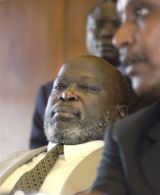Hundreds of Janjaweed militiamen shifted outside Darfur: Garang
By ELLEN KNICKMEYER, Associated Press Writer
KHARTOUM, Sudan, Sep 30, 2004 (AP) — Sudan has moved hundreds of Darfur’s pro-government Arab militia fighters to the distant south and east of Africa’s largest nation, taking them far from growing international scrutiny in bloodied Darfur, a south Sudan rebel leader charged Thursday.

|
| John Garang, leader of the rebel SPLM, during a press conference in Cairo, Egypt Thursday, Sep 30, 2004. |
International military monitors in Sudan’s war-battered south have expressed concern, and investigated, according to a monitoring-mission document obtained by The Associated Press.
“They are in three areas other than Darfur,” including along the Ethiopian border and in southern Sudan’s oil regions, John Garang, leader of southern Sudan’s rebel Sudan’s Peoples Liberation Army, told a news conference in Cairo.
Also Thursday, Sudan and U.S. leaders leveled accusations over the western Darfur region, with Sudan’s president charging Washington with training and arming the rebels, and the U.S. secretary of state saying that commercial interests were keeping some nations from backing sanctions against Sudan over Darfur.
The U.N. Security Council is weighing genocide accusations and possible sanctions on Sudan’s oil industry over Darfur, where conflict has driven 1.4 million of the western region’s non-Arab villagers from their homes.
Sudan’s Arab-dominated government is accused of mobilizing Arab tribal fighters for air-raid-backed attacks on Darfur’s non-Arab villagers, in retaliation for uprisings launched by two non-Arab Darfur rebel movements in February 2003.
Sudan denies any responsibility in the bloodletting and says it has disarmed some of the Arab militiamen, known broadly as Janjaweed.
Sudanese officials could not be reached for comment Thursday on claims of south Sudan rebels and others that some Arab militia fighters have been shipped out of Darfur, to Sudan’s south and east, rather than disarmed as demanded by the United Nations.
The charge by Garang highlights the dangers that Darfur’s roiling conflict poses to what are meant to be the final stages of peace talks for south Sudan.
A separate, 21-year civil war in the south has killed 2 million people, most from famine brought on by the conflict.
Asked about the alleged Janjaweed move south, Garang said, “I can confirm that they are now in the Blue Nile on the Ethiopian border.”
Rebels had reports that “at least some 200 were taken there,” he said. “We also have reports that some of them were taken to eastern Sudan as well as in the oil areas in the south.
Overseers of the international Verification and Monitoring Teams mission for south Sudan were authorized in August to investigate claims that Janjaweed militia had been moved to southern areas outside Darfur, according to an internal report, obtained by the AP on condition that it not quote directly from the document.
Officials within the document expressed concern at the reported movement.
Officials of the south Sudan monitoring teams, known for reticence with the media, could not be reached for comment Thursday.
Sudanese government ministers referred questions to Cabinet Minister Majzoub al-Khalifa Ahmed, a top figure in the ruling party and in peace talks, who did not respond to phone calls taken by aides.
In Egypt, the leading al-Ahram daily carried an interview in which Sudan’s president called Washington the instigator of Darfur’s rebellion.
“The United States is the one behind it,” President Omar el-Bashir said. “They drove the rebels to Eritrea, held training camps, spent money, armed them, and gave them cell phones to communicate between each other from once place to another around the world.”
In Washington, U.S. Secretary of State Colin Powell accused four Security Council members — China, Russia, Algeria and Pakistan — of valuing their business deals in Sudan over humanitarian concerns in Darfur. All four abstained from an 11-0 vote two weeks ago that set up a commission to investigate the genocide charges against Sudan.
“There are some of these countries that just don’t like the possibility of sanctions, and others that had commercial interests that they thought would not be well-served if they voted against Sudan’s interest in this resolution,” Powell said in a U.S. radio interview.
___
Associated Press reporter Salah Nasrawi in Cairo, Egypt, contributed to this report.
